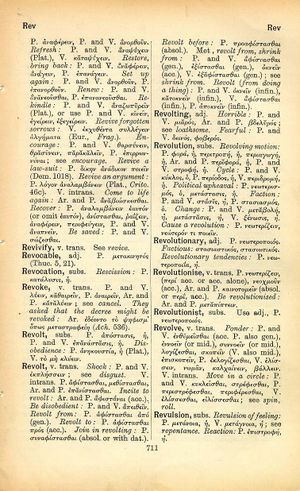revolutionise: Difference between revisions
From LSJ
οὗτος μὲν ὁ πιθανώτερος τῶν λόγων εἴρηται, δεῖ δὲ καὶ τὸν ἧσσον πιθανόν, ἐπεί γε δὴ λέγεται, ῥηθῆναι → this is the most credible of the stories told; but I must relate the less credible tale also, since they tell it
(CSV4) |
m (Woodhouse1 replacement) |
||
| Line 1: | Line 1: | ||
{{Woodhouse1 | {{Woodhouse1 | ||
|Text=[[File:woodhouse_711.jpg|thumb|link={{filepath:woodhouse_711.jpg}}]] | |Text=[[File:woodhouse_711.jpg|thumb|link={{filepath:woodhouse_711.jpg}}]] | ||
P. νεωτερίζειν, ([[περί]] acc. or acc. alone), νεοχμοῦν (acc.), Ar. and P. καινοτομεῖν (absol. or περί, acc.). | ===verb transitive=== | ||
[[prose|P.]] [[νεωτερίζειν]], ([[περί]] acc. or acc. alone), [[νεοχμοῦν]] (acc.), [[Aristophanes|Ar.]] and [[prose|P.]] [[καινοτομεῖν]] (absol. or [[περί]], acc.). | |||
[[be revolutionised]]: [[Aristophanes|Ar.]] and [[prose|P.]] [[μεταπίπτειν]]. | |||
}} | }} | ||
Revision as of 08:56, 20 May 2020
English > Greek (Woodhouse)
verb transitive
P. νεωτερίζειν, (περί acc. or acc. alone), νεοχμοῦν (acc.), Ar. and P. καινοτομεῖν (absol. or περί, acc.).
be revolutionised: Ar. and P. μεταπίπτειν.

